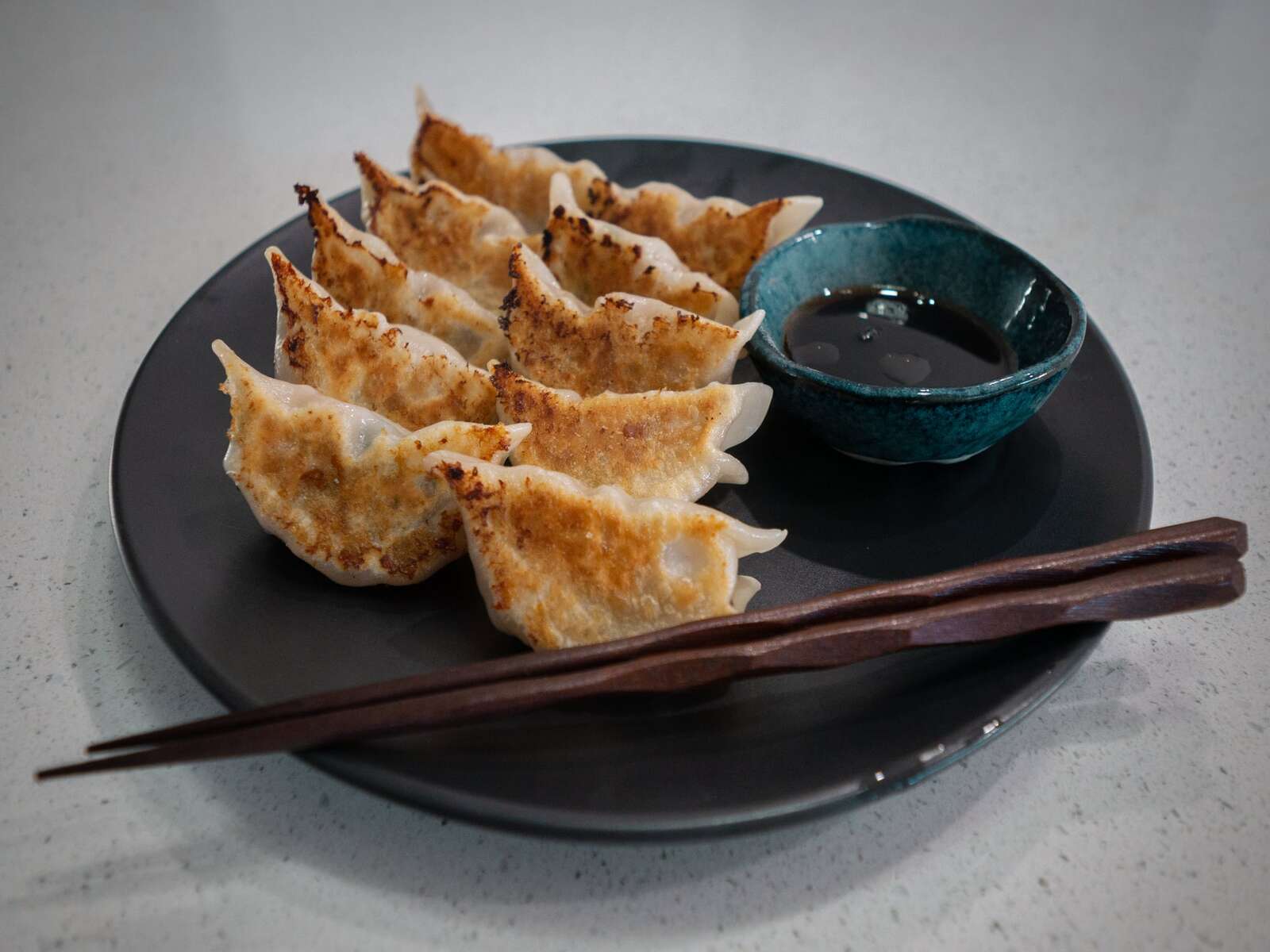
Gyoza, also known as Japanese dumplings, have gained popularity worldwide for their savory filling and irresistibly crispy exterior. These delectable treats have become a staple in Japanese cuisine and are now enjoyed by food lovers around the globe.
While gyoza is undeniably delicious, it’s important to understand its nutritional aspects as well. In this article, we will explore 18 gyoza nutrition facts to give you a comprehensive understanding of what you’re indulging in when you bite into these mouthwatering dumplings.
From the calories and macronutrient breakdown to the various vitamins and minerals present in gyoza, you’ll discover how this flavorful dish can fit into your balanced diet. So, whether you’re a fan of meat-filled gyoza or prefer the vegetarian options, keep reading to uncover the nutritional secrets of this beloved Japanese delight.
Key Takeaways:
- Gyoza are a delicious and nutritious option, offering protein, fiber, and essential vitamins and minerals. They can be a flavorful addition to a balanced diet.
- With low calories, high protein, and various fillings, gyoza can be a versatile and healthy choice for satisfying your taste buds and fueling your body.
Low in Calories
Gyoza are relatively low in calories compared to other fried or greasy dishes, making them a healthier option for those watching their calorie intake.
High in Protein
These delectable dumplings are a great source of protein, with each gyoza containing a generous amount to help fuel your body.
Rich in Carbohydrates
Gyoza are primarily made with a dough wrapper, which adds a good amount of carbohydrates to your diet and provides energy for the day.
Contains Dietary Fiber
The filling of gyoza often includes vegetables like cabbage and garlic, which are rich in dietary fiber that aids in digestion and promotes a healthy gut.
Packed with Essential Vitamins
Gyoza fillings can include ingredients like mushrooms and spinach, which are excellent sources of vitamins such as vitamin C, vitamin D, and various B vitamins.
Provides Important Minerals
Gyoza can contribute to your mineral intake, as they often contain ingredients like ginger and green onions, which provide minerals like potassium and magnesium.
Low in Fat
Gyoza are typically pan-fried or steamed, resulting in a lower fat content compared to deep-fried options.
Contains Antioxidants
Some gyoza fillings feature ingredients like garlic and ginger, which are known for their antioxidant properties that help protect the body against free radicals.
Can be a Source of Iron
The inclusion of ingredients like lean meats in gyoza makes them a good source of iron, which is essential for carrying oxygen throughout the body.
Offers Calcium
Some gyoza recipes incorporate ingredients such as tofu, which adds calcium to the dish, thereby supporting bone health.
Low in Cholesterol
Gyoza made with lean meats and minimal oil have a low cholesterol content, making them suitable for individuals with specific dietary needs.
Gluten-Free Options Available
For those with gluten sensitivities or celiac disease, there are gluten-free gyoza wrappers and fillings available, allowing everyone to enjoy these delicious dumplings.
May Contain Omega-3 Fatty Acids
If gyoza are made with seafood fillings such as shrimp or salmon, they can provide a source of omega-3 fatty acids, which are beneficial for heart health.
Can be Vegan-Friendly
Vegetable-filled gyoza or those made with tofu are excellent options for individuals following a plant-based or vegan diet.
May Boost Metabolism
Gyoza fillings often include ingredients like chili peppers or ginger, which can help rev up your metabolism and aid in weight management.
Contains Essential Amino Acids
The combination of meats and vegetables in gyoza provides a mix of essential amino acids that are vital for various bodily functions.
Aids Healthy Digestion
Thanks to their fiber content, gyoza can promote healthy digestion and prevent issues like constipation.
Delicious and Versatile
Apart from their nutritional benefits, gyoza are just downright delicious! With various fillings and dipping sauces available, you can enjoy gyoza in different ways and satisfy your taste buds.
The 18 gyoza nutrition facts mentioned above highlight the potential health benefits of incorporating these delightful dumplings into your diet. Whether you indulge in them as an appetizer or enjoy them as a main course, gyoza can be a tasty addition to your meals. So, go ahead and explore the world of gyoza for a flavorful and nutritious dining experience!
Conclusion
In conclusion, gyoza is a delicious and versatile dish with several nutritional benefits. These bite-sized wonders are packed with protein, vitamins, and minerals, making them a great addition to any diet. Gyoza can be enjoyed as an appetizer, snack, or main course, and can be prepared in various ways to suit different dietary preferences. Whether pan-fried, steamed, or boiled, gyoza offers a tantalizing combination of flavors and textures that will satisfy even the most discerning palate. So go ahead and indulge in this Japanese delicacy, knowing that you’re not only treating your taste buds but also nourishing your body.
FAQs
1. Are gyoza healthy?
Gyoza can be a healthy choice as it is typically low in calories and high in protein. However, the nutritional content can vary depending on the ingredients and cooking method used. Opting for lean protein fillings and lighter cooking methods like steaming or boiling can make gyoza a healthier option.
2. Are gyoza gluten-free?
Traditional gyoza wrappers are made from wheat flour and are not gluten-free. However, you can find alternative wrappers made from rice flour or tapioca starch that are gluten-free. Make sure to check the label or ask the restaurant before consuming gyoza if you have gluten sensitivities or dietary restrictions.
3. How many calories are there in gyoza?
The calorie content of gyoza can vary depending on the size and filling. On average, a serving of five gyoza can range from 200 to 300 calories. It’s important to note that the cooking method, such as pan-frying, can add additional calories.
4. Can I freeze gyoza?
Yes, gyoza can be frozen for later consumption. Place the uncooked gyoza in a single layer on a baking sheet and freeze until solid. Then transfer them to a sealable bag or container for long-term storage. Frozen gyoza can be cooked directly from frozen, just increase the cooking time slightly.
5. Are there any vegetarian or vegan gyoza options available?
Yes, there are vegetarian and vegan gyoza options available. Traditional gyoza fillings often include meat or seafood, but you can find delicious alternatives made with tofu, vegetables, or even mushrooms. Just make sure to check the ingredients or ask for vegan options in restaurants.
Was this page helpful?
Our commitment to delivering trustworthy and engaging content is at the heart of what we do. Each fact on our site is contributed by real users like you, bringing a wealth of diverse insights and information. To ensure the highest standards of accuracy and reliability, our dedicated editors meticulously review each submission. This process guarantees that the facts we share are not only fascinating but also credible. Trust in our commitment to quality and authenticity as you explore and learn with us.


